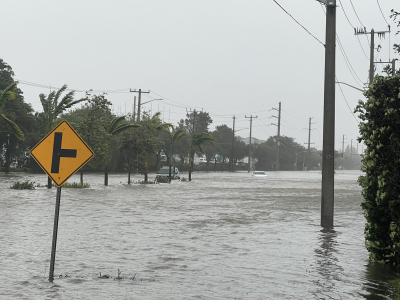Safety & Preparedness
Be aware of the steps to take to ensure personal safety.
Before a Flood/Hurricane:
To prepare for a flood, you should:
- Avoid building in a floodprone area unless you elevate and reinforce your home.
- Elevate the furnace, water heater, and electric panel if susceptible to flooding.
- Install "check valves" in sewer traps to prevent floodwater from backing up into the drains of your home.
- Know your hurricane evacuation level, know your evacuation routes and plan where you will go.
- Prepare a small bag with essentials.
- Be cautious at night.
- Have battery-operated flashlights, radios and televisions in working condition.
- Shut off water service, gas service and electricity to your home.
- Heed warnings from officials – evacuate when orders are given.
- Ensure your pets safety. Kennel space is limited and there are only a few shelters that will accept pets. Develop a plan.
During a Flood/Hurricane:
The following are guidelines for the period during a flood:
- Do not panic.
- Tune in to local media for flood watches and warnings.
- Do not walk through moving water. Six inches of moving water can make you fall. If you have to walk in water, walk where the water is not moving. Use a stick to check the firmness of the ground in front of you.
- Do not drive into flooded areas. If floodwaters rise around your car, abandon the car and move to higher ground if you can do so safely. You and the vehicle can be quickly swept away.
- Six inches of water will reach the bottom of most passenger cars causing loss of control and possible stalling.
- One foot of water will float many vehicles.
- Two feet of rushing water can carry away most vehicles including sport utility vehicles (SUV’s) and pick-ups.
After a Flood/Hurricane:
The following are guidelines for the period following a flood:
- Listen for news reports to learn whether the community’s water supply is safe to drink.
- Avoid floodwaters; water may be contaminated by oil, gasoline, or raw sewage. Water may also be electrically charged from underground or downed power lines.
- Avoid moving water.
- Be aware of areas where floodwaters have receded. Roads may have weakened and could collapse under the weight of a car.
- Stay away from downed power lines, and report them to the power company.
- Return home only when authorities indicate it is safe.
- Stay out of any building if it is surrounded by floodwaters.
- Use extreme caution when entering buildings; there may be hidden damage, particularly in foundations.
- Service damaged septic tanks, cesspools, pits, and leaching systems as soon as possible. Damaged sewage systems are serious health hazards.
- Clean and disinfect everything that got wet. Mud left from floodwater can contain sewage and chemicals.
- Watch for critters such as snakes, raccoons, possums and insects that may have "moved" into your evacuated home, since they too look for shelter and relief from flood waters.
Electrical Safety After A Disaster
- Serious injury can result for anyone dealing with the aftermath of a major storm, hurricane, tornado, or other disaster.
- Be aware of outdoor hazards. Watch out for loose or dangling power lines, and report them immediately to proper authorities. It is not unusual in a disaster such as this for more people to be killed by carelessness in the aftermath than were killed by the event itself.
- Be sure all electric and gas services are turned off before entering buildings for the first time.
- Disconnect the main switch and all circuits.
- Remove covers from all outlets and fuses or multi-breaker boxes and flush with clean water. Let dry and spray with contact cleaner/ lubricant.
- Watch for electrical shorts or live wires. Don't turn on any lights or appliances until an electrician has checked the system for short circuits.
- Electric motors in appliances that have been flooded should be thoroughly cleaned and reconditioned before they are put back into service.
- Cut off all electrical circuits at the fuse panel or disconnect all electrical appliances.

